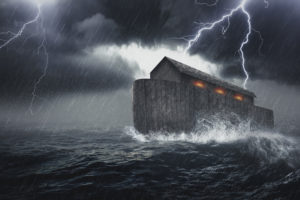
If you grew up in one of the three major Abrahamic faiths, you’re probably familiar with the story of Noah that appears in the Hebrew Tanakh, the Old Testament, and several portions of the Quran. Many versions of the classic narrative depict the patriarch and his family surviving a global flood after being divinely instructed to build an enormous ark. However, multiple cultures worldwide have their own flood myths, and some of these stories may predate the Noah’s tale. Examining these legends can prove to be both fascinating and illuminating.
Flood Myths on Nearly Every Continent
Hundreds of flood legends exist from around the globe, with several recounting that the rising waters come at the behest of angry deities intending to punish humanity or cleanse the planet of evil. These tales have been found in African, Asian, European, and Middle Eastern civilizations as well as indigenous American and Polynesian cultures. Some examples include the following:
- Hopi myths about Spider Grandmother, who helped the righteous escape destructive floodwaters by taking refuge in small boats made from hollow reeds
- Oshun, a Yoruba deity who floods the world if angered but calls back the waters when she is appeased
- Incan stories of the Unu Pachakuti, a massive deluge that nearly wiped out the civilizations around Lake Titicaca
Curiously, many of these narratives share key similarities while the societies in which they originated are separated by oceans, continents, and even centuries. Modern scholars search for an explanation, but some propose that they were devised to explain cataclysmic natural events. It’s worth noting that there’s evidence for tsunamis or rapidly melting glaciers occurring in several regions of the world prior to written human history.
Manu and Matsya: A Man, a Fish God, and a Boat
The Encyclopedia Britannica briefly describes the Hindu tale of Manu and Matsya. Several Vedic and other religious texts document the narrative, which depicts Matsya as an avatar or Vishnu or Brahma. The god appears first as a tiny fish appealing to Manu for protection, then offering to save him from an impending deluge in return. Manu houses Matsya in a small pot of water, then transfers him to larger containers as he grows. The king later builds a large boat at Matsya’s command, then escapes the flood by riding in the vessel while the fish deity pulls it through the waters. A year later, a human woman is born from the flood waters and joins with Manu to become humankind’s ancestors.
The Gilgamesh Epic: A Precursor to Noah?
Writer Ishaan Tharoor mentions the Epic of Gilgamesh in an April 2014 Time article, detailing that its flood narrative likely predates the one in the Book of Genesis by several thousand years. One common misconception is that Gilgamesh escapes from a flood, but this deluge story speaks of a man named Utnapishtim. Ea, a powerful Sumerian deity, informs Utnapishtim of a conspiracy among the gods to flood the planet. Utnapishtim then constructs a large boat capable of transporting dozens of animals along with his relatives and craftsmen and sets sail as the waters rise. Once the grateful man finds dry land, he offers a sacrifice and lives happily ever after with his wife. Utnapishtim later recounts this story to Gilgamesh, who records it in this epic tale.
The Genesis narrative of Noah may be the most famous flood myth, but it’s certainly not the only one. These stories exist in cultures on almost every continent, with nearly all of them ending with one or a handful of human survivors. Perhaps our ancestors imagined these myths to explain destructive deluges threatening their civilizations in a time before written history, but we will never know for sure. For now, we can understand them as evidence that hope exists as a universal human experience.

